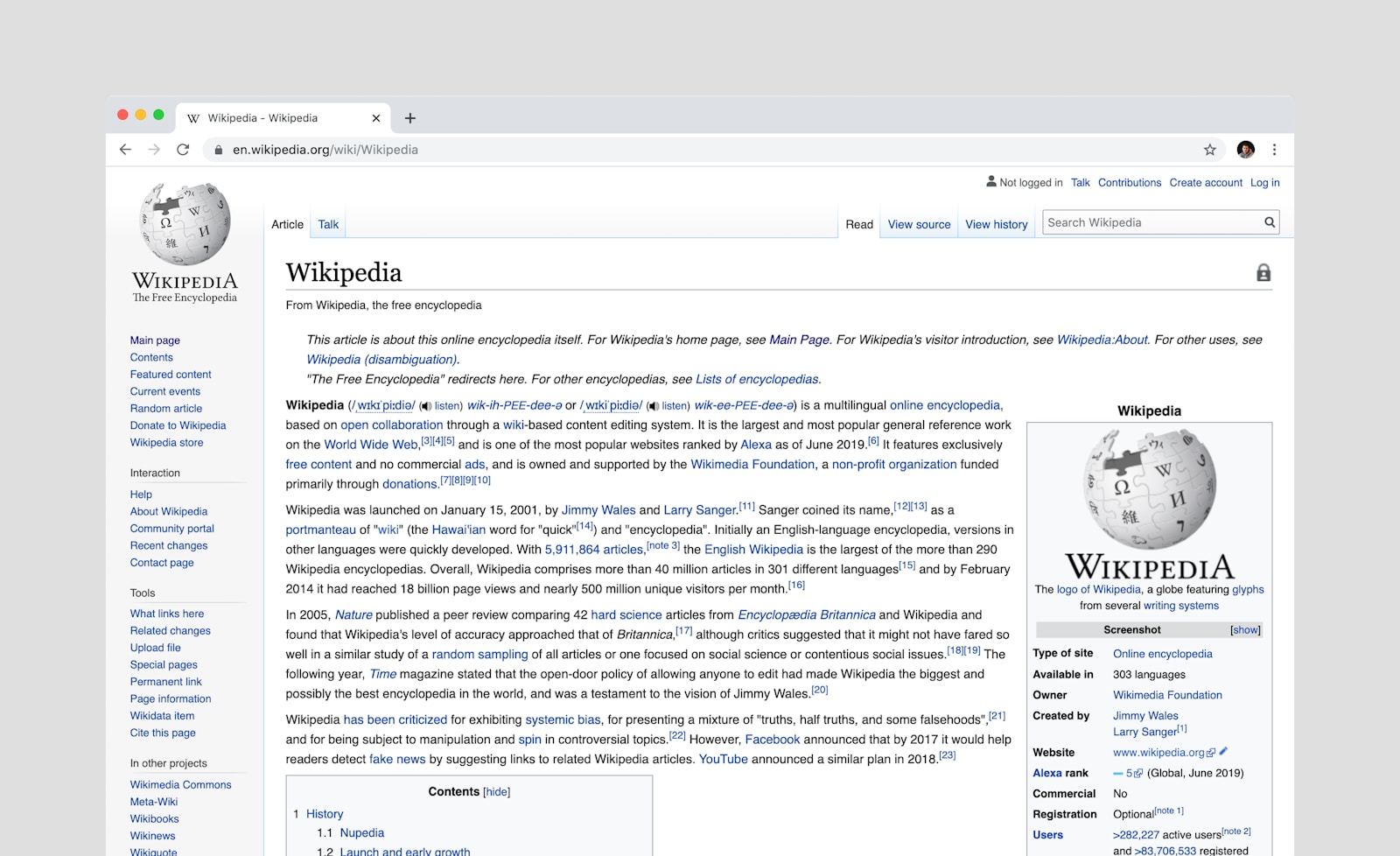If you’ve ever Googled a brand, public figure or event, chances are Wikipedia was one of the top results. It’s one of the most visited websites in the world, and more importantly, it’s a trusted source that shapes public perception across search engines, media coverage and even AI models. But did you know that Wikipedia can even support your marketing strategy?
For marketers, that makes Wikipedia a surprisingly powerful part of brand visibility and reputation management. But navigating its rules, culture and editorial expectations isn’t as simple as just writing a glowing company bio.
In this blogpost, we dive into the world of Wikipedia marketing: what it is, why it matters, and what you need to know before editing or starting a page.
With insights from Bill Beutler, one of the world’s leading experts in ethical Wikipedia consulting, you’ll learn:
- What qualifies a brand or person for a Wikipedia page
- How to make updates without getting flagged
- Why neutrality and citations are non-negotiable
- Common mistakes brands make (and how to avoid them)
- How Wikipedia is shaping AI and search reputation
Why Wikipedia Still Matters for Marketing in 2025
Why Wikipedia pages? What’s your origin story?
I actually became fascinated with Wikipedia several years before I ever tried to edit it myself. In the early 2000s I was just out of college, I had lucked into a job at a subscription-only political news site in DC, and in my role there I was doing news aggregation. Long before we had that word. I spent a lot of time reading independent blogs, and that’s where I first found Wikipedia, because these bloggers kept linking to it to establish basic facts and concepts.
And Wikipedia—this site was wild. It basically covered every topic imaginable, in this dry detached voice that was kind of amusing on its own. I just lost hours following various rabbit holes. At first my focus was the content of the articles, but very soon I wanted to know how they were constructed. What were the rules, what were the guardrails, that made all this possible?
So that curiosity would be very important later on. A few years later, I was working at a public affairs firm in the DC area. My boss asked if I would make a change to his friend’s entry, which I did, but I also left a note explaining the change I’d made. That led to a brief exchange with an editor who said, OK, thanks for doing it that way.
So that was my lightbulb moment—that Wikipedia was sometimes wrong or incomplete, and you had to be mindful of Wikipedia’s rules around editing your own page, but this was potentially a valuable service.
And you flash forward almost 20 years, now we’re a company of around 20 people, which is also wild to me.
Understanding Notability Rules for Wikipedia
What steps should someone take to start their own Wikipedia page and ensure it stays approved?
This is one of the most challenging questions to answer, because part of the answer is: there aren’t steps that everyone can take that will be successful. Wikipedia has a rule describing which topics get their own Wikipedia page, called Notability. It’s pretty dense, but the gist is you need a lot of news coverage: both quality and quantity, and over a long period of time.
Wikipedia’s “Notability” rule governs who qualifies. In short:
- You need significant media coverage—quality, quantity, and over time.
- Most brands don’t meet that bar.
- Some can work with a publicist to build enough visibility, but it’s not always possible.
Don’t Edit Your Own Page (and What to Do Instead)
What are the best practices for updating a Wikipedia page without running into trouble?
The first rule of updating a Wikipedia page about yourself is: don’t edit the page directly.
The second rule is: don’t the page edit directly.
Why?
Wikipedia assumes companies can’t write about themselves neutrally, no matter their intent. Instead, use the article’s Talk Page to make suggestions. If your case is clear and supported by evidence, editors may make the change for you.
Oftentimes, that’s easier said than done. If there is a new CEO and you want to make sure this change is reflected, you can probably figure out how to make that request. But if the article is super out-of-date, or there’s some unfair criticism, or it needs a lot of work—that’s when it makes sense to call in someone like us.
What Wikipedia Likes (and What Gets You Flagged)
What misconceptions do clients have when first approaching you about creating or editing a Wikipedia page?
So many. Even though Wikipedia has been around over 20 years, and everyone knows something about it, it’s still sometimes hard for clients to understand some of Wikipedia’s rules to harness for marketing.
A big one that still comes fairly often is when a client asks if we can remove a historical detail they don’t like, maybe an embarrassing co-founder, or a business unit that failed in a very public way. Their view is, well, this isn’t who we are anymore. But that’s not how Wikipedia works.
Most Wikipedia articles about companies have a “History” section, and all of them cover relevant topics back to the founding.
You can’t leave “New Coke” out of the article about Coca-Cola. Some clients are slow to accept that Wikipedia wants to tell the whole story, not just the recent one.
What are the key requirements for getting a Wikipedia page for a person or brand?
I mentioned before that you need sources to qualify for a Wikipedia page, but there’s a lot more to know about it.
Your company or brand needs to be the subject of independent reported news and analysis with sufficient depth to tell your story in general, and it needs to be written by professional journalists at recognisable publications, it needs to have been in the news for a few years, and finally you have to show your brand has a claim to fame, that there is public interest beyond your own market niche.
That’s a tall order, and it’s meant to be. Wikipedia editors keep the bar for inclusion fairly high to keep their pages accurate and manageable.
If there’s a grey area, it’s the fact that whether a topic is “notable” from Wikipedia’s perspective can vary, depending on who’s reviewing it. It’s not unheard of for one editor to approve a submitted article, and another editor to decide before long this was a mistake, and remove it.
As a result, we are very cautious about promising we can get a new page for a client. If there’s any ambiguity at all, we’re very up-front about it, and let the client decide if they want to go for it.
Common Wikipedia Mistakes
- The thing most people get wrong, and I base this on reviewing many, many attempts at writing a new page, is that they somehow overlook Wikipedia’s formatting conventions, both for style and for citations. I presume they think a best effort will be enough, someone else will do the rest. In most cases, this is wrong.
- Someone willing to take the time to write a draft owes it to themselves to check it against existing Wikipedia articles and follow the same format. If you don’t do that, you’re not setting yourself up to succeed.
- Do yourself a favour: study up on Wikipedia’s “manual of style” and learn how to use its citation templates.
What’s the one thing brands keep getting wrong on Wikipedia?
Failing to take it seriously on its own terms. On one hand, brand managers may be very concerned about Wikipedia if it has incorrect information. But then oftentimes they won’t take it seriously enough to learn how to fix it the right way.
Pro tip: If you’re writing a page, study existing ones first.
The biggest issue? Ignoring Wikipedia’s formatting rules.
- Many assume a “good enough” draft is fine.
- They hope someone else will tidy it up later.
But this usually backfires.
- Wikipedia expects adherence to its Manual of Style.
- Citations must follow specific templates.
- Your draft should resemble a typical Wikipedia article—structure and all.
How to Earn Credibility
How do you showcase achievements while keeping things neutral on Wikipedia?
That’s a great question. We’re really proud of the work we do, and we do it transparently on Wikipedia, but even so the client usually will prefer not to call attention to the work elsewhere. Just because someone out there might be looking to cause trouble, so why stir the pot?
We’re fortunate that we do have a handful of clients who have trusted us to let us post some case studies on our website. And anytime we’re sharing previous work, we’re always very clear what we did was make the article more informative, more accurate, and more neutral. Our mission is to bring good information about our clients to Wikipedia’s pages, and that keeps things neutral.
How important are citations and references? Which sources do Wikipedia editors trust most?
Someone once told me, “if Wikipedia is a battle, the citations are bullets.” Now, I don’t think Wikipedia is a battle—at least most pages aren’t. But it’s not wrong.
Any fact you want to stick on Wikipedia needs a good quality citation.
Because if you add something based on personal knowledge, but it isn’t published anywhere else, how can anyone know it’s true? And if there is, can we trust that published source?
Bill Beutler
Rolling Stone is good for music coverage, but its political news is less respected. There’s no official “good sources” list, but Wikipedia editors keep a page called “Perennial sources” that tracks debated sources.
A good citation must be:
- Specific (linked directly to the fact being cited)
- Independent (not self-published or paid for)
- Reputable (recognised expertise in the subject)
The Hidden Marketing Influence
How important is having a well-maintained Wikipedia page, what are some real life examples of the impact?
I think it depends on what kind of brand or company you are. If you’re a well-known brand and there’s public interest in your products and services, then having an accurate, up-to-date page on Wikipedia is just good informational hygiene.
It depends on your brand size and visibility:
- If you’re a startup or lesser-known brand, it’s more like a luxury or milestone.
- If you’re a well-known brand, an accurate Wikipedia page is informational hygiene.
Understanding Wikipedia’s Impact
As far as real-life examples, it’s difficult to measure the ROI of a Wikipedia page reliably. Ultimately, it’s more public relations than it is marketing. But I can think of a magazine editor whose bio we wrote and later he was appointed to a top government post.
I can think of clients who had successful fundraising rounds and IPOs after we helped improve their coverage. And at least one political consultant who went on to get a TV deal.
And nowadays it’s having a big impact on AI. Everyone thought Wikipedia was important because Google relied on it—now AI is leaning on it just as heavily, if not more. So that’s another reason why, if you qualify for a Wikipedia page, it’s worth making sure it’s right.
About Bill Beutler
Bill Beutler is the founder and president of Beutler Ink, a digital agency that helps companies, organizations, and public figures manage Wikipedia, search, and AI reputation. With nearly two decades of experience at the intersection of media, tech, and communications, Bill is one of the foremost experts in ethical Wikipedia consulting and a trusted advisor to executives, communications leaders, and organizations navigating high-visibility reputational challenges.
Curious to learn more about how Wikipedia shapes public perception and business strategy? Subscribe to WikiWise, Beutler Ink’s monthly newsletter exploring the intersection of Wikipedia and the business world.
Want more? Here's your invitation from the school ⤵️
We don’t teach you how to do more. We teach you how to do it better.
You don’t need more hacks. You need smarter foundations, better systems, and clarity that cuts through the noise.You got into this to make a difference. Let’s help you do that, with strategy and a whole lotta heart.
➡️ Find out how we can help via our all-access pass.



